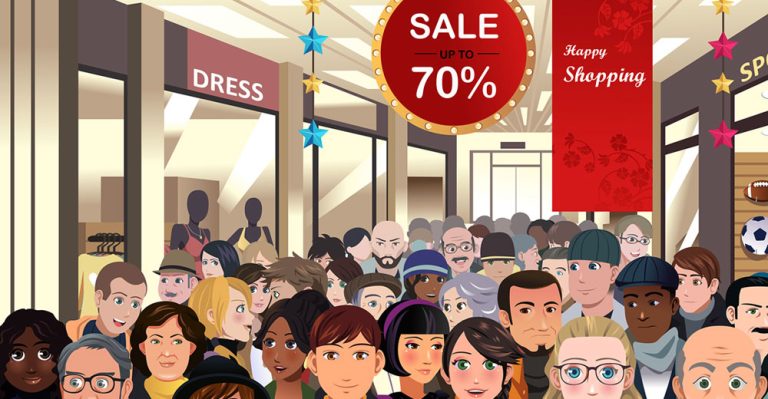
Retailers: What number of customers do it is advisable to fear about this vacation season? The reply, it seems, is 5. Nicely, type of.
In an 18-month international examine of shopping for conduct, Epam Continuum discerned a crucial sample that immediately’s shoppers fall into 5 broad classes of customers: the investigative client, the frivolous spender, the experience-driven purchaser, the fluctuant shopper, and the aware client.
To assist organizations put these insights to work and optimize advertising efforts, retailers might wish to give attention to the way to apply this sample in the course of the 2022 vacation season profitably.
Retailers should perceive the consumers they’ll be assembly within the retailer, on-line, and over the cellphone. Every group is aware of what they need and isn’t shy about saying when sellers don’t meet these expectations. So, let’s prepare for the push.
A Sensible Taxonomy of 5 Varieties of Buyers
1. Investigative shoppers view merchandise as investments and do their analysis to find one of the best worth. They take pleasure in discovering high quality merchandise at discounted costs.
‘Tis the season for reductions. The spending this season is projected to be up 7.1%, which is disappointing in comparison with 2021’s 8.5% improve. The present financial atmosphere could have retailers closely centered on investigative shoppers. Considerate cut price procuring is a development that’s taking maintain, and retailers should acknowledge it. It could be that inflationary occasions make investigative shoppers out of everybody to a point.
With this group, Cameron Davis, head of digital technique at Greatest Purchase, says, “Guaranteeing that the proper content material and particulars can be found in your web site and in search phrases is essential.” He states that along with offering conventional on-line content material, his group is “build up a digital retailer the place we will have shoppers simply converse over video with a digital specialist inside a class in a consultative method.”
Investigative shoppers are inclined to buy items on-line, the place a wealth of data is at their fingertips. To win them over, retailers ought to present detailed product info and specs, rankings and critiques, and aggressive pricing.
Davis says there are actual enterprise advantages to retailers right here. In an internet setting, “improved monitoring and responsiveness to market modifications are essential.” This contains every part “from monitoring opponents for undercuts and pricing-arbitrage points to making sure higher social listening to advertise optimistic product factors and repair unfavourable product attributes.” Such digital intelligence will undoubtedly assist retailers minimize prices.
2. Frivolous spenders discover pleasure in procuring, usually are not price-sensitive and have a procuring angle characterised by spontaneity. They’re making up for the misplaced time within the post-pandemic period.
It’s possible that, proper now, the frivolous spenders are a minority of shoppers. Nonetheless, it’s price excited about them as a result of they could be a good income. If an organization offers a services or products these customers can’t resist, they proceed to checkout.
Companies ought to supply these frivolous associates “particular version” objects this vacation season which are solely accessible for a restricted time as they can not resist once-in-a-lifetime alternatives.
Along with creating distinctive presents and new-product-launch specials, Davis says retailers ought to “search for areas to deepen platform or bucketed shopping for. Take a look at entire classes collectively, corresponding to front room, wardrobe, and AV gear.”
These shoppers don’t simply need one-off merchandise, says Davis. As a substitute, they may possible be “open to bucketing of products and experiences.” He advises manufacturers to “deepen membership perks and loyalty with this phase” as a result of they’re in “the present marketplace for future stickiness.”
3. Expertise-driven consumers are much less centered on materials possessions however are keen to spend loosely on experiences, corresponding to journey and cultural or social actions.
Individuals are once more getting out of the home — into shops, eating places, and the world at massive. Retailers ought to take into consideration this and think about which merchandise pair greatest with experiences.
“Look to interact them inside the bodily retailer or in new digital channels with one thing that permits for the aspirational trial of the product,” says Davis. He sees retailers rethinking what a bodily retailer might be, the way it can present a very distinctive expertise, and “spotlight merchandise inside their pure use circumstances.”
The experience-driven purchaser is a tough phase for retailers, as they’re extra prone to gravitate towards “experiential” items — a visit to Europe or a pleasant dinner. He means that retailers give attention to advertising merchandise with an experiential part, corresponding to a brand new suitcase for the journey to Europe or a pleasant bottle of scotch to go along with that dinner.
Lastly, with regard to experience-driven consumers, Davis says retailers ought to think about partnerships. “For our retail shops, we frequently work carefully with our vendor companions to make sure that our shoppers can trial the product in-store in the absolute best method.”
He factors to partnership examples, corresponding to West Elm’s REI assortment or Delta’s Peloton on-screen courses, which have produced new areas of mutual profit. The query is: With whom might your corporation most profitably accomplice?
4. Fluctuant customers might be frugal at most occasions however spend recklessly at others, relying on their temper or circumstances.
It’s laborious to foretell how the fluctuant shopper feels at any given second, so retailers want salespeople and digital neighborhood managers who excel at studying buyer moods.
The trick right here is for retailers to supply a procuring expertise that influences the temper of fluctuant customers to make them extra inclined to spend. Interactions with retailer workers are sometimes crucial and missed variable within the general buyer expertise, so be sure to rent the proper individuals this vacation season. Make investments correctly in workers. A enterprise might must pay somewhat extra, however the ROI might be important.
For his half, Davis says that retailers ought to, with this group, attempt to be “prime of thoughts, from a advertising and model place, in order that when the second hits, they go to you.” He provides that using “always-on advertising” and successfully utilizing information and analytics might assist retailers “discover peaks and troughs of effectiveness in promotional actions.”
5. Acutely aware shoppers might be influenced by the values of a corporation, the standard of its merchandise, and its environmental influence.
The vacation season doesn’t imply that prospects will relinquish their values. Actually, for some individuals, procuring is an outstanding method to present their beliefs to family and friends. To make sure that retailers attain this phase, they have to know what they stand for and talk that.
It’s important to supply transparency and, the place potential, facilitate side-by-side comparisons of product attributes that allow shoppers to make knowledgeable choices. An instance is Complete Meals Market and its use of a six-point scale, starting from 1 to five+, to price the animal welfare requirements of merchandise in its meat division. This strategy helps shoppers stay their values and conveys the corporate’s values by displaying prospects it agrees that the attribute is essential.
Davis urges retailers to proceed highlighting these values “that are genuine to your organization. Whereas we don’t at all times see direct causation of spend attributable to espousing values, we do know that when there’s a lack of authenticity or whitewashing, firms can face backlash.” As well as, he notes that moral retailing is now tables stakes “in how we deal with workers, which distributors we work with, and what we’re keen to do to show to the client we’re genuine.”


